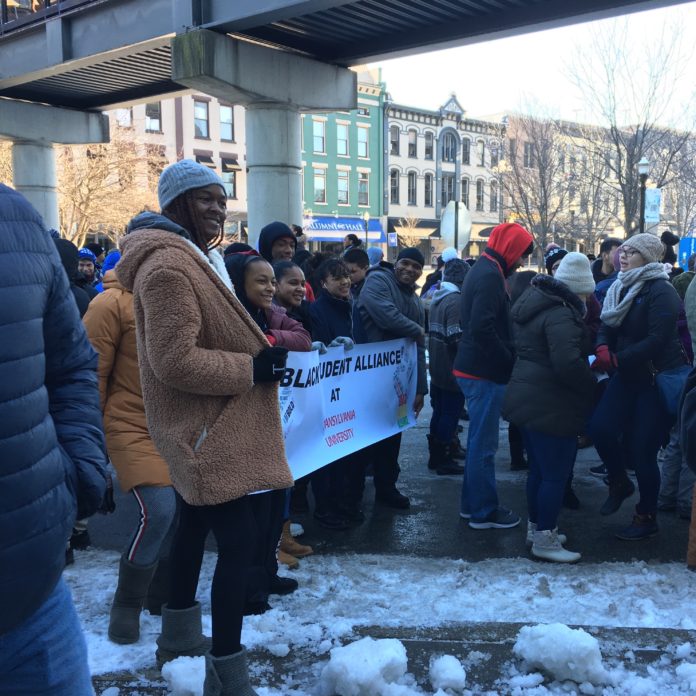Approximately 25 Transy students joined this morning’s Martin Luther King Jr. memorial march in downtown Lexington. Transy’s participation was organized by the Black Student Alliance (BSA) in conjunction with the University’s Athletics Department.
Junior Taryn Glass said that it was important to “always remember” the legacy of Dr. King, and that the march “helps us stay together as a community.”
Glass, who is affiliated with BSA, said that it was important for BSA to be involved because BSA “represent[s] the small minority on this campus” of black students. She said that being organized shows that “ we can overcome and we can still be together.”
The students were joined by several University staff & administration members, as well as by BSA faculty adviser Dr. Veronica Dean-Thacker.
Dr. Michael Covert, the Dean of Student Life, said that he “want[s] to support the students and support the mission of the MLK march.” He felt it was important “for the Transylvania community to be a part of that.”
Te’Asia Martin, the Assistant Director of Diversity & Campus Engagement, said that she was “really excited that the Athletic Department supported this.” Martin noted that the “better portion” of the students in attendance came from either the BSA or the Athletic teams. She also noted that the Student Organization for Latinos (SOL) and other groups were represented.
The march, which began from the Lexington Convention Center and ran in a loop around the downtown area, lasted from 10:00am to approximately 10:45am. The marchers ranged from the generally apolitical to the more politically engaged, with some carrying signs reading “Stop Racism Now” and calling for “Racial Justice Now!”
The annual holiday comes at a time when Kentucky courts are considering a racially disparate felon disenfranchisement system that is the subject of both a state-level lawsuit and a political fight in the Legislature. Nearly one in four black Kentuckians are currently barred from voting for life; Kentucky is one of only two states to impose lifetime voting bans on felons.
Dr. King spent much of his career working to advance voting rights for black Americans, especially in the South. Those efforts resulted in the Civil Rights Act of 1964 and the Voting Rights Act of 1965. Substantial portions of the Voting Rights Act were declared unenforceable by a 5-4 majority of the Supreme Court in 2013, in the case Shelby County v. Holder; voting rights advocates at the time called it a decision that would “enact measures with potentially devastating consequences on political participation by communities of color.” In the years since the Shelby County decisions, there have been many new restrictions placed on voting rights, especially in the South.




[…] Rambler Coverage of MLK Day March. […]